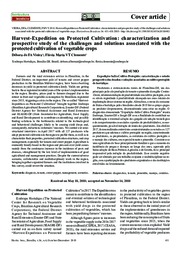Harvest-expedition on protected cultivation characterization and prospective study of the challenges and solutions associated with the protected cultivation of vegetable crops.
Harvest-expedition on protected cultivation characterization and prospective study of the challenges and solutions associated with the protected cultivation of vegetable crops.
Author(s): VIEIRA, D. de F. A.; CLEMENTE, F. M. V. T.
Summary: Farmers and the rural extension service in Planaltina, in the Federal District, an important pole of tomato and sweet pepper production in the Brazilian Midwest region, have been observing decreases in yield in protected cultivation lately. Yields are getting back to those registered in initial years of the system?s implementation in the region. Besides, prices paid to farmers dropped due to the retreat in fruit and vegetable consumption by Brazilians registered since 2015, triggering a crisis in the region. The so-called ?Harvest-Expedition on Protected Cultivation? brought together Embrapa (Brazilian Agricultural Research Corporation), Emater-DF (Federal District Agency for Technical Assistance and Rural Extension) and SEAGRI-DF (State Secretariat for Agriculture, Food Supply, and Rural Development) to contribute on identifying and possibly finding solutions to the bottlenecks related to the technological and behavioral challenges likely to be causing yield drops and, consequently, reductions in farmers? incomes. We carried out semi-structured interviews in April 2017 with all 127 producers who adopt protected cultivation in the region to profile them, as well as to characterize their properties, protected cultivation structures, and crop management, especially for tomato and sweet pepper. Agriculture is eminently family-based in the region and pressure over yield comes mainly from the continuous increase in the incidence of pests and diseases, strengthened by the low level of implementation of good agricultural and management practices. Despite the current adverse scenario, collaborative and multidisciplinary work in the region, bringing together organized farmers and the institutions involved in this survey, could revert the situation.
Publication year: 2018
Types of publication: Journal article
Unit: Embrapa Vegetables
Keywords: Cultivo Protegido, Pimentão, Produtividade, Tomate
Observation
Some of Embrapa's publications are published as ePub files. To read them, use or download one of the following free software options to your computer or mobile device. Android: Google Play Books; IOS: iBooks; Windows and Linux: Calibre.
Access other publications
Access the Agricultural Research Database (BDPA) to consult Embrapa's full library collection and records.
Visit Embrapa Bookstore to purchase books and other publications sold by Embrapa.

